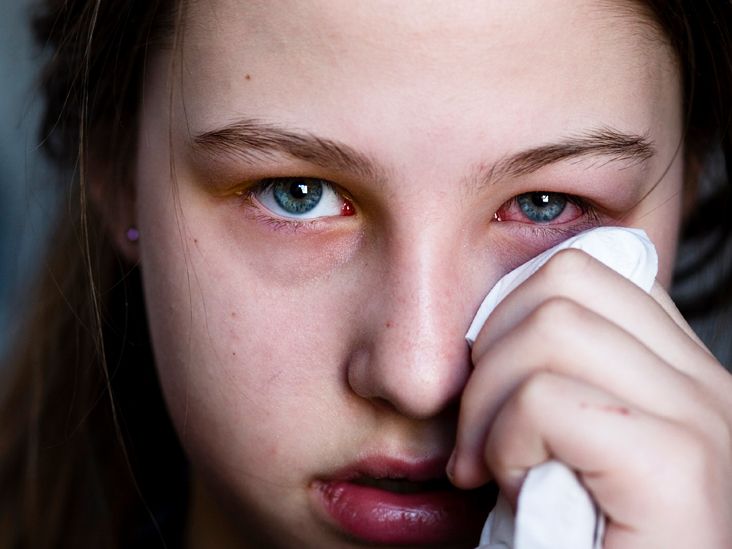You should avoid attending school with pink eye due to its highly contagious nature. The infection requires immediate attention and possible medical treatment.
Pink eye, or conjunctivitis, is a common eye condition that can cause discomfort, redness, and discharge. This eye ailment can spread rapidly in school environments where close contact is frequent. For the well-being of the student affected and their peers, it’s essential to minimize the risk of transmission.
Taking a break from school to recuperate, consult with a healthcare provider, and employ good hygiene practices is both responsible and recommended. Ensuring you get proper care and keep others safe from the spread of infection is a priority when dealing with pink eye, typically warranting a few days away from school until symptoms improve.
Credit: www.bswhealth.com
The Basics Of Pink Eye
Pink eye, medically known as conjunctivitis, is an eye infection or inflammation.
The clear covering of your eyeball and the inside of your eyelids get red and swollen.
This condition can come from viruses, bacteria, allergens, or irritants.
Common signs include itchiness, redness, tearing, and discharge that may crust over the lashes.
Germs spread easily, often through hand-to-eye contact or sharing items.
Children are frequently exposed because they are in close contact with others at school.
Contagiousness Of Conjunctivitis
Pink Eye, also known as conjunctivitis, is highly contagious. It can spread easily from person to person. Common ways to catch this eye infection include:
- Touching an infected person’s eyes or face.
- Using items like towels or pillows that touched their eyes.
- Sneezing or coughing can send germs through the air.
- Sharing makeup or eye drops with someone infected.
Good hygiene is key to prevent spreading Pink Eye. Always wash your hands thoroughly. Don’t touch your eyes with dirty hands. Do not share personal items like washcloths or eye products.
School Policy And Illness
Schools often have clear rules for when students should stay home. Pink eye, or conjunctivitis, is an infection your eyes can get. It can make your white eye parts turn pink or red. Because you can give it to others, it’s best to not go to school.
Most schools say you should stay home if you have pink eye. Your school wants to make sure other kids don’t get sick from you. Pink eye spreads very easily, especially in classrooms.
You can return to school when you have medicine and no more goopy eyes. Your doctor will help you know when it’s safe. Always listen to your school’s advice on staying healthy.

Credit: www.healthline.com
Treating Pink Eye
Pink eye, also known as conjunctivitis, can be uncomfortable. Good hygiene is crucial to prevent its spread. Always wash your hands before and after touching your eyes. Use a clean washcloth dampened with warm water to wipe away eye discharge. Replace and wash your pillowcases and avoid sharing towels or cosmetics. Cool compresses reduce discomfort. For allergic conjunctivitis, over-the-counter antihistamine eye drops may help.
| Type of Pink Eye | Medical Treatment |
|---|---|
| Bacterial | Prescribed antibiotic eye drops or ointments |
| Viral | Often clears up without treatment |
| Allergic | Antihistamines or steroids |
| Chemical | Rinse eyes with saline and seek medical attention |
Recovery And Returning To School
Pink eye, or conjunctivitis, is an eye condition that can be contagious. Feeling better involves noticing certain signs of recovery. Your eye redness should be fading, with no more sticky discharge. Itching and discomfort should be gone too. Most importantly, eye tears and white or yellow drainage should have stopped.
To ensure it’s safe to return to school, consult with a doctor. A minimum of 24 hours on antibiotic drops is a common guideline. Feeling symptom-free for at least 24 hours is also crucial. It shows you’re likely past the contagious stage. Always follow your school’s policy on communicable diseases.
Remember, washing hands frequently and not sharing personal items will help prevent the spread of pink eye. Your return to school can be safe for everyone after these measures. It is essential for your health and others around you.
Preventing Future Cases
Maintaining good hygiene is crucial to prevent pink eye. Regular hand washing with soap and water is essential. Avoid touching your eyes with dirty hands. Address this with your kid to ensure they understand its importance.
Teach kids the importance of not sharing personal items, like towels or pillows. Make sure they know using someone else’s stuff can spread germs. Clean surfaces and toys regularly, as pink eye can be transmitted through contact with contaminated objects.
Parents and teachers should work together to implement these hygiene best practices in schools and homes. Kids learning about eye health will lead to fewer pink eye outbreaks and create a healthier community for everyone.

Credit: www.medicalnewstoday.com
Frequently Asked Questions Of Are You Supposed To Go To School With Pink Eye
How Long Do You Have To Stay Out Of School For Pink Eye?
Typically, you should stay out of school for 24 hours after starting treatment for pink eye, or until symptoms have resolved. Consult your doctor for personalized advice.
How Long Is Pink Eye Contagious For?
Pink eye, or conjunctivitis, can be contagious for up to two weeks after symptoms first appear. It remains contagious as long as symptoms persist.
Can Pink Eye Go Away In A Day?
Pink eye, or conjunctivitis, typically does not resolve within a day. Recovery time varies but often requires several days to weeks, depending on the cause. Consult a healthcare professional for advice and treatment.
What Should I Do If My Child Has Pink Eye?
Consult your pediatrician at the first sign of pink eye. Follow their prescribed treatment, which may include antibiotic drops for bacterial infections. Keep your child’s hands clean and avoid touching the eyes to prevent spreading.
Conclusion
Navigating the decision to attend school with pink eye can be tricky. Prioritize health and consult your doctor; it’s essential. Remember, rest is key for recovery and preventing spread. Always consider others’ well-being alongside your own educational needs. Act responsibly, and when in doubt, opt to stay home.

